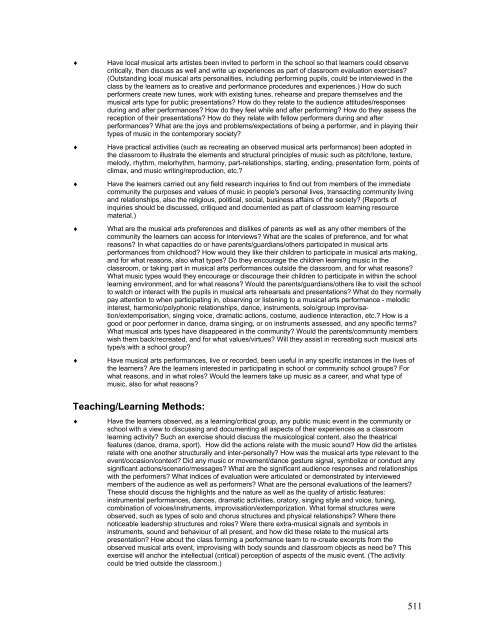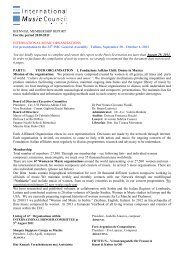Appendix 6 - International Music Council
Appendix 6 - International Music Council
Appendix 6 - International Music Council
Create successful ePaper yourself
Turn your PDF publications into a flip-book with our unique Google optimized e-Paper software.
♦ Have local musical arts artistes been invited to perform in the school so that learners could observe<br />
critically, then discuss as well and write up experiences as part of classroom evaluation exercises?<br />
(Outstanding local musical arts personalities, including performing pupils, could be interviewed in the<br />
class by the learners as to creative and performance procedures and experiences.) How do such<br />
performers create new tunes, work with existing tunes, rehearse and prepare themselves and the<br />
musical arts type for public presentations? How do they relate to the audience attitudes/responses<br />
during and after performances? How do they feel while and after performing? How do they assess the<br />
reception of their presentations? How do they relate with fellow performers during and after<br />
performances? What are the joys and problems/expectations of being a performer, and in playing their<br />
types of music in the contemporary society?<br />
♦ Have practical activities (such as recreating an observed musical arts performance) been adopted in<br />
the classroom to illustrate the elements and structural principles of music such as pitch/tone, texture,<br />
melody, rhythm, melorhythm, harmony, part-relationships, starting, ending, presentation form, points of<br />
climax, and music writing/reproduction, etc.?<br />
♦ Have the learners carried out any field research inquiries to find out from members of the immediate<br />
community the purposes and values of music in people's personal lives, transacting community living<br />
and relationships, also the religious, political, social, business affairs of the society? (Reports of<br />
inquiries should be discussed, critiqued and documented as part of classroom learning resource<br />
material.)<br />
♦ What are the musical arts preferences and dislikes of parents as well as any other members of the<br />
community the learners can access for interviews? What are the scales of preference, and for what<br />
reasons? In what capacities do or have parents/guardians/others participated in musical arts<br />
performances from childhood? How would they like their children to participate in musical arts making,<br />
and for what reasons, also what types? Do they encourage the children learning music in the<br />
classroom, or taking part in musical arts performances outside the classroom, and for what reasons?<br />
What music types would they encourage or discourage their children to participate in within the school<br />
learning environment, and for what reasons? Would the parents/guardians/others like to visit the school<br />
to watch or interact with the pupils in musical arts rehearsals and presentations? What do they normally<br />
pay attention to when participating in, observing or listening to a musical arts performance - melodic<br />
interest, harmonic/polyphonic relationships, dance, instruments, solo/group improvisation/extemporisation,<br />
singing voice, dramatic actions, costume, audience interaction, etc.? How is a<br />
good or poor performer in dance, drama singing, or on instruments assessed, and any specific terms?<br />
What musical arts types have disappeared in the community? Would the parents/community members<br />
wish them back/recreated, and for what values/virtues? Will they assist in recreating such musical arts<br />
type/s with a school group?<br />
♦ Have musical arts performances, live or recorded, been useful in any specific instances in the lives of<br />
the learners? Are the learners interested in participating in school or community school groups? For<br />
what reasons, and in what roles? Would the learners take up music as a career, and what type of<br />
music, also for what reasons?<br />
Teaching/Learning Methods:<br />
♦ Have the learners observed, as a learning/critical group, any public music event in the community or<br />
school with a view to discussing and documenting all aspects of their experiences as a classroom<br />
learning activity? Such an exercise should discuss the musicological content, also the theatrical<br />
features (dance, drama, sport). How did the actions relate with the music sound? How did the artistes<br />
relate with one another structurally and inter-personally? How was the musical arts type relevant to the<br />
event/occasion/context? Did any music or movement/dance gesture signal, symbolize or conduct any<br />
significant actions/scenario/messages? What are the significant audience responses and relationships<br />
with the performers? What indices of evaluation were articulated or demonstrated by interviewed<br />
members of the audience as well as performers? What are the personal evaluations of the learners?<br />
These should discuss the highlights and the nature as well as the quality of artistic features:<br />
instrumental performances, dances, dramatic activities, oratory, singing style and voice, tuning,<br />
combination of voices/instruments, improvisation/extemporization. What formal structures were<br />
observed, such as types of solo and chorus structures and physical relationships? Where there<br />
noticeable leadership structures and roles? Were there extra-musical signals and symbols in<br />
instruments, sound and behaviour of all present, and how did these relate to the musical arts<br />
presentation? How about the class forming a performance team to re-create excerpts from the<br />
observed musical arts event, improvising with body sounds and classroom objects as need be? This<br />
exercise will anchor the intellectual (critical) perception of aspects of the music event. (The activity<br />
could be tried outside the classroom.)<br />
511



